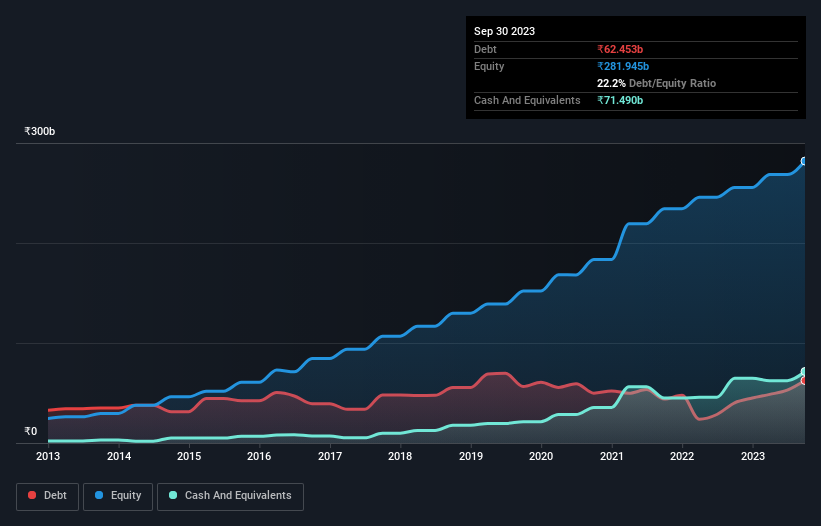Aurobindo Pharma (NSE:AUROPHARMA) Has A Pretty Healthy Balance Sheet

The external fund manager backed by Berkshire Hathaway's Charlie Munger, Li Lu, makes no bones about it when he says 'The biggest investment risk is not the volatility of prices, but whether you will suffer a permanent loss of capital.' So it might be obvious that you need to consider debt, when you think about how risky any given stock is, because too much debt can sink a company. We note that Aurobindo Pharma Limited (NSE:AUROPHARMA) does have debt on its balance sheet. But the real question is whether this debt is making the company risky.
Why Does Debt Bring Risk?
Generally speaking, debt only becomes a real problem when a company can't easily pay it off, either by raising capital or with its own cash flow. In the worst case scenario, a company can go bankrupt if it cannot pay its creditors. However, a more usual (but still expensive) situation is where a company must dilute shareholders at a cheap share price simply to get debt under control. Having said that, the most common situation is where a company manages its debt reasonably well - and to its own advantage. When we think about a company's use of debt, we first look at cash and debt together.
Check out our latest analysis for Aurobindo Pharma
How Much Debt Does Aurobindo Pharma Carry?
The image below, which you can click on for greater detail, shows that at September 2023 Aurobindo Pharma had debt of ₹62.5b, up from ₹40.2b in one year. But it also has ₹71.5b in cash to offset that, meaning it has ₹9.04b net cash.

How Strong Is Aurobindo Pharma's Balance Sheet?
Zooming in on the latest balance sheet data, we can see that Aurobindo Pharma had liabilities of ₹130.1b due within 12 months and liabilities of ₹27.2b due beyond that. On the other hand, it had cash of ₹71.5b and ₹46.5b worth of receivables due within a year. So its liabilities outweigh the sum of its cash and (near-term) receivables by ₹39.3b.
Of course, Aurobindo Pharma has a market capitalization of ₹623.2b, so these liabilities are probably manageable. However, we do think it is worth keeping an eye on its balance sheet strength, as it may change over time. While it does have liabilities worth noting, Aurobindo Pharma also has more cash than debt, so we're pretty confident it can manage its debt safely.
Also good is that Aurobindo Pharma grew its EBIT at 16% over the last year, further increasing its ability to manage debt. There's no doubt that we learn most about debt from the balance sheet. But it is future earnings, more than anything, that will determine Aurobindo Pharma's ability to maintain a healthy balance sheet going forward. So if you want to see what the professionals think, you might find this free report on analyst profit forecasts to be interesting.
Finally, a business needs free cash flow to pay off debt; accounting profits just don't cut it. Aurobindo Pharma may have net cash on the balance sheet, but it is still interesting to look at how well the business converts its earnings before interest and tax (EBIT) to free cash flow, because that will influence both its need for, and its capacity to manage debt. Over the last three years, Aurobindo Pharma reported free cash flow worth 14% of its EBIT, which is really quite low. That limp level of cash conversion undermines its ability to manage and pay down debt.
Summing Up
We could understand if investors are concerned about Aurobindo Pharma's liabilities, but we can be reassured by the fact it has has net cash of ₹9.04b. And it impressed us with its EBIT growth of 16% over the last year. So we don't have any problem with Aurobindo Pharma's use of debt. When analysing debt levels, the balance sheet is the obvious place to start. But ultimately, every company can contain risks that exist outside of the balance sheet. To that end, you should be aware of the 2 warning signs we've spotted with Aurobindo Pharma .
Of course, if you're the type of investor who prefers buying stocks without the burden of debt, then don't hesitate to discover our exclusive list of net cash growth stocks, today.
New: Manage All Your Stock Portfolios in One Place
We've created the ultimate portfolio companion for stock investors, and it's free.
• Connect an unlimited number of Portfolios and see your total in one currency
• Be alerted to new Warning Signs or Risks via email or mobile
• Track the Fair Value of your stocks
Have feedback on this article? Concerned about the content? Get in touch with us directly. Alternatively, email editorial-team (at) simplywallst.com.
This article by Simply Wall St is general in nature. We provide commentary based on historical data and analyst forecasts only using an unbiased methodology and our articles are not intended to be financial advice. It does not constitute a recommendation to buy or sell any stock, and does not take account of your objectives, or your financial situation. We aim to bring you long-term focused analysis driven by fundamental data. Note that our analysis may not factor in the latest price-sensitive company announcements or qualitative material. Simply Wall St has no position in any stocks mentioned.
About NSEI:AUROPHARMA
Aurobindo Pharma
A biopharmaceutical company, engages in the manufacture of generic formulations and active pharmaceutical ingredients in India, the United States of America, Europe, Puerto Rico, and internationally.
Excellent balance sheet and good value.


